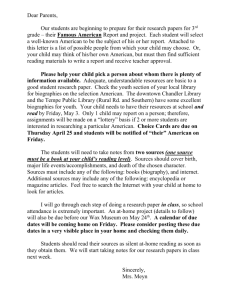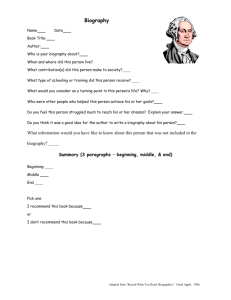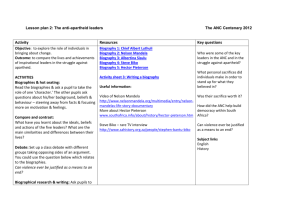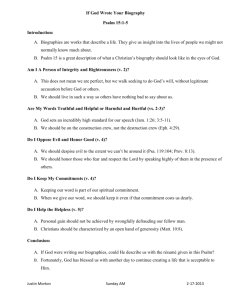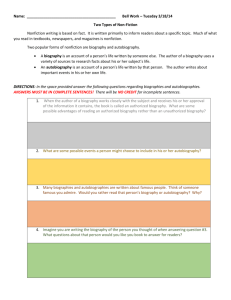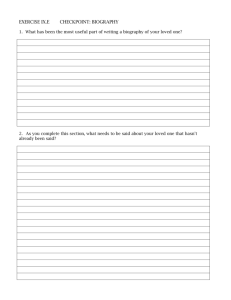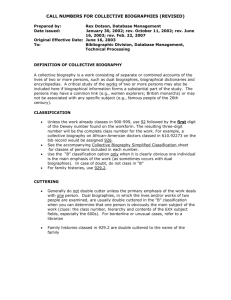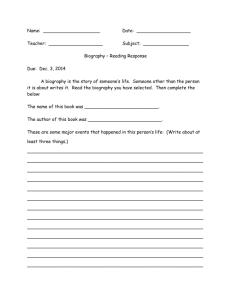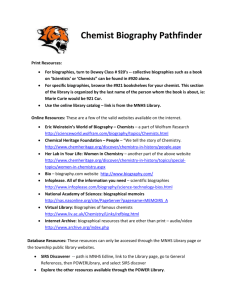Text/Speaking/Listening
advertisement
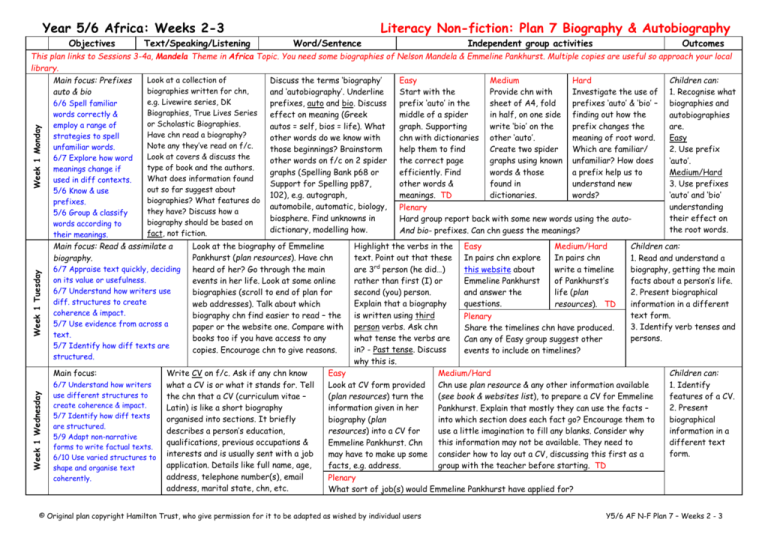
Year 5/6 Africa: Weeks 2-3 Objectives Text/Speaking/Listening Literacy Non-fiction: Plan 7 Biography & Autobiography Word/Sentence Independent group activities Outcomes Week 1 Monday This plan links to Sessions 3-4a, Mandela Theme in Africa Topic. You need some biographies of Nelson Mandela & Emmeline Pankhurst. Multiple copies are useful so approach your local library. Look at a collection of Main focus: Prefixes Discuss the terms ‘biography’ Easy Medium Hard Children can: biographies written for chn, and ‘autobiography’. Underline Start with the Provide chn with Investigate the use of 1. Recognise what auto & bio e.g. Livewire series, DK 6/6 Spell familiar prefixes, auto and bio. Discuss prefix ‘auto’ in the sheet of A4, fold prefixes ‘auto’ & ‘bio’ – biographies and Biographies, True Lives Series words correctly & effect on meaning (Greek middle of a spider in half, on one side finding out how the autobiographies or Scholastic Biographies. employ a range of autos = self, bios = life). What graph. Supporting write ‘bio’ on the prefix changes the are. Have chn read a biography? strategies to spell other words do we know with chn with dictionaries other ‘auto’. meaning of root word. Easy Note any they’ve read on f/c. unfamiliar words. those beginnings? Brainstorm help them to find Create two spider Which are familiar/ 2. Use prefix Look at covers & discuss the 6/7 Explore how word other words on f/c on 2 spider the correct page graphs using known unfamiliar? How does ‘auto’. type of book and the authors. meanings change if graphs (Spelling Bank p68 or efficiently. Find words & those a prefix help us to Medium/Hard What does information found used in diff contexts. Support for Spelling pp87, other words & found in understand new 3. Use prefixes out so far suggest about 5/6 Know & use 102), e.g. autograph, meanings. TD dictionaries. words? ‘auto’ and ‘bio’ biographies? What features do prefixes. automobile, automatic, biology, understanding Plenary they have? Discuss how a 5/6 Group & classify biosphere. Find unknowns in their effect on Hard group report back with some new words using the autobiography should be based on words according to dictionary, modelling how. the root words. And bioprefixes. Can chn guess the meanings? fact, not fiction. their meanings. Week 1 Tuesday Main focus: Read & assimilate a biography. 6/7 Appraise text quickly, deciding on its value or usefulness. 6/7 Understand how writers use diff. structures to create coherence & impact. 5/7 Use evidence from across a text. 5/7 Identify how diff texts are structured. Main focus: Week 1 Wednesday 6/7 Understand how writers use different structures to create coherence & impact. 5/7 Identify how diff texts are structured. 5/9 Adapt non-narrative forms to write factual texts. 6/10 Use varied structures to shape and organise text coherently. Look at the biography of Emmeline Pankhurst (plan resources). Have chn heard of her? Go through the main events in her life. Look at some online biographies (scroll to end of plan for web addresses). Talk about which biography chn find easier to read – the paper or the website one. Compare with books too if you have access to any copies. Encourage chn to give reasons. Write CV on f/c. Ask if any chn know what a CV is or what it stands for. Tell the chn that a CV (curriculum vitae – Latin) is like a short biography organised into sections. It briefly describes a person’s education, qualifications, previous occupations & interests and is usually sent with a job application. Details like full name, age, address, telephone number(s), email address, marital state, chn, etc. Highlight the verbs in the Easy Medium/Hard Children can: text. Point out that these In pairs chn explore In pairs chn 1. Read and understand a are 3rd person (he did…) this website about write a timeline biography, getting the main rather than first (I) or Emmeline Pankhurst of Pankhurst’s facts about a person’s life. second (you) person. and answer the life (plan 2. Present biographical Explain that a biography questions. resources). TD information in a different is written using third text form. Plenary person verbs. Ask chn 3. Identify verb tenses and Share the timelines chn have produced. what tense the verbs are persons. Can any of Easy group suggest other in? - Past tense. Discuss events to include on timelines? why this is. Easy Medium/Hard Children can: Look at CV form provided Chn use plan resource & any other information available 1. Identify (plan resources) turn the (see book & websites list), to prepare a CV for Emmeline features of a CV. information given in her 2. Present Pankhurst. Explain that mostly they can use the facts – biography (plan biographical into which section does each fact go? Encourage them to information in a resources) into a CV for use a little imagination to fill any blanks. Consider why different text this information may not be available. They need to Emmeline Pankhurst. Chn form. may have to make up some consider how to lay out a CV, discussing this first as a group with the teacher before starting. TD facts, e.g. address. Plenary What sort of job(s) would Emmeline Pankhurst have applied for? © Original plan copyright Hamilton Trust, who give permission for it to be adapted as wished by individual users Y5/6 AF N-F Plan 7 – Weeks 2 - 3 Year 5/6 Africa: Weeks 2-3 Week 1 Friday Week 1 Thursday Objectives Text/Speaking/Listening Literacy Non-fiction: Plan 7 Biography & Autobiography Word/Sentence Main focus: Compare lives of Ask chn if they know who Nelson Mandela is? Why is he well-known? Where did/does he live? Look at one or more book biographies of Emmeline Pankhurst & Nelson Nelson Mandela (see suggested book list, but could include any others Mandela 5/7 Use evidence from across a you have available). Look at a traditional biography first. What features can chn identify? Write a list on f/c. Third person, past tense, text to explain events. subheadings, paragraphs, facts, chronological order, captions, 6/7Appraise a text quickly, photographs, text boxes, etc. If possible then compare with the deciding on its value, quality or graphic biography or Peaceful Protest. Some features are the same, usefulness. but others are different – differences: drawings, speech bubbles in 6/8 Read extensively & discuss graphic version, more like a narrative. Both of the ‘narrative reading with others. biographies’ contain features usually found in information books, e.g. 6/1 Use a range of oral bibliography, map, pronunciation guide, glossary, index, background techniques to present information, timeline, etc. Which do chn prefer? Why? Which is the persuasive arguments. most useful for finding facts? Are drawings or photographs most 5/1 Sequence points logically, effective? defending views with evidence. Main focus: Write a book review Look again briefly at the biographies of Nelson Mandela. Discuss the features & the usefulness in understanding & finding out 5/9 Adapt non-narrative forms to about Mandela’s life. If you have copies of any Emmeline Pankhurst write factual texts. book biographies they could be included at this point. Discuss book 5/7Compare different types of reviews – why are they written, who writes them, what are their information texts. features? What makes a book review good? Look at one of the 6/7 Understand how writers use books to find out information about it, e.g. title, author, illustrator different structures to create if relevant, publisher, date of publication, ISBN number, Indicate impact. 6/9 Select words & language drawing the blurb on the back cover – sometimes quotes from reviews are on their knowledge of formal writing. included there. Show chn a paper review layout (plan resources) 5/8 Reflect on reading preferences. and some online reviews for Amazon (plan resources) – though 6/8 Discuss personal reading with sadly these are not very plentiful or enthralling! Which do chn others. think they might find the most useful? © Original plan copyright Hamilton Trust, who give permission for it to be adapted as wished by individual users Independent group activities Outcomes Easy/Medium/Hard Discuss the fact that we have looked at Emmeline Pankhurst’s life & now at Nelson Mandela’s. What do they have in common? What are the differences? Chn work in small groups to prepare a comparison between the lives of Pankhurst & Mandela. Chn will need to decide the layout of their comparison – a table with two columns, paragraphs with subheadings, or…? They can use ICT or write by hand. TD as required Plenary Discuss chn’s findings. Have both campaigners received the recognition they deserve? Would chn look up to either person as a hero/heroine? Children can: 1. Recognise features of biographies. 2. Compare the lives of two wellknown campaigners. 3. Give their opinion. Easy/Medium/Hard Some good reviews for these books are needed! Can chn help out? Chn each write a book review for their favourite biography about Pankhurst or Mandela. They can use differentiated plan resource (recommended) or write a review for Amazon (could actually publish some?). TD with Medium Plenary Read some samples of the chn’s reviews. These reviews could be put in the school library to help other chn choose the best book to read to find out about Nelson Mandela or Emmeline Pankhurst. Children can: 1. Recognise the features of a good book review. 2. Write a book review. Y5/6 AF N-F Plan 7 – Weeks 2 - 3 Year 5/6 Africa: Weeks 2-3 Week 2 Wednesday Week 2 Tuesday Week 2 Monday Objectives Text/Speaking/Listening Main focus: Planning autobiography 6/8 Compare how different writers present experiences. 6/9 Set own challenges to extend experience in writing. 5/8 Compare how a common theme is presented by different writers. 5/9 Adapt non-narrative forms & styles to write factual texts. Literacy Non-fiction: Plan 7 Biography & Autobiography Word/Sentence Show chn Nelson Mandela’s autobiography called Long Walk to Freedom. Explain that he wrote the original book for adults, but that this is an abridged version written by Chris van Wyk. An abridged text is one that has been shortened without losing the sense. Show chn some of the pages without reading the text & ask what else makes this book suitable for chn. The illustrations, large text, map, glossary. Read several pieces of the text – how is this different/similar from/to the biographies? First person is used (I, we), past tense, etc. Nelson Mandela includes personal feelings, e.g. about being reunited with his family after being released from Robben Island prison, which a biography cannot include in the same way, though quotes from Mandela are included. Do chn prefer the autobiography or one of the biographies? Take a vote (thumbs up) & ask volunteers to explain why. Independent group activities Write fact, fiction and opinion on f/c. Can chn explain what these mean? Download the activity from the Oxfam site that asks chn to sort statements about Nelson Mandela into fact, fiction & opinion. Outcomes Easy/Medium/Hard Chn draw a timeline of their life to start the planning of their own autobiography. Include significant dates such as their birth date, when they started school, when their siblings were born, etc. but also include significant dates, e.g. when I first watched my football team play live or when I first rode a horse. Perhaps add what they would like to do in the future – these ideas can be used for the ending of their autobiography. TD as req’d Plenary Explain that tomorrow chn will be given the chance to write their autobiographies. They don’t need to research the facts as they know themselves better than anyone else, but they might want to double check some dates at home this evening. Main focus: Writing Remind chn that they are writing their Write a complex sentence Easy/Medium/Hard Give chn plenty of time autobiographies today. Briefly recap on the on the board, e.g. – I first to write their autobiographies. Have they autobiography features to use, e.g. first person, past tense, managed to include any complex sentences became interested in 5/9 Adapt non-narrative and possibly text boxes, subheadings, pictures using suitable connectives? Remind chn that styles to write factual texts. football in 2004, although with captions, etc. Look at the titles of some these are not likely to be very long as they 5/9 Reflect independently & it wasn’t until 2006 that I (auto)biographies (plan resources). Highlight critically on own writing & went to my first match at…. have only lived a few years of their lives yet! Once finished encourage chn to check their how they are often clever plays on words and edit & improve it. Discuss how although has own work & then share with a response certainly better than just e.g. Nelson Mandela. 6/9 In non-narrative, been used as a connective. Peaceful Protest – The Life of Nelson partner using 3 stars and a wish (plan establish, balance & maintain Make a list of suitable Mandela sounds much more interesting. resources). Edit & redraft their work. TD viewpoints. connectives on the f/c & 6/6 Use a range of strategies Encourage chn to be imaginative when choosing briefly discuss in what Plenary Share some of the chn’s the title of their autobiographies, e.g. ‘Andrew to edit, proofread & correct situation you would use autobiographies. Are there any outstanding – the Life and Times of a Football Fan’ or spelling in their own work. each. 5 min maximum. titles to comment on? Create a class book of ‘Horsing Around with Gemma’. 6/3 Criticise constructively. the autobiographies. Remind chn that there is more to biographies today than just printed pages! Take a look at Main focus: Look at Easy/Medium/Hard the biography for chn of Mary Seacole http://www.bbc.co.uk/schools/famouspeople/ (link Chn work in grps to look at in more detail & online biographies on left hand side), before searching the Audio and Visual archive of the BBC to see what 6/7. Appraise a text compare interactive web biogs about Mary else we can find out about this famous nurse of the past (weblinks below). What are chn’s 5/7 Make notes on & Seacole from BBC’s Famous People site & impressions of these online biography resources? What might be the advantages of use evidence across a other sites. Make notes. Each grp reports presenting the information in this way? They can stimulate more of the senses; sight text. back on their findings in the plenary. TD 5&6/12 Make informed (moving images!) sounds, etc and sometimes allows you to navigate your way through the Plenary Groups report on web biographies – choices about ICT use. information quickly so that you can find answers. Are there any disadvantages? Not are they all effective, useful, interesting? everyone has a computer/less permanent than a book… © Original plan copyright Hamilton Trust, who give permission for it to be adapted as wished by individual users Children can: 1. Recognise the features of an autobiography. 2. Compare biographies with autobiography. 3. Plan own autobiography. Children can: 1. Write complex sentences. 2. List suitable connectives. 3. Write an autobiography using features. 4. Edit & redraft their work. Children can: 1. Understand & use interactive biographies online. 2. Research biographical info & make notes. Y5/6 AF N-F Plan 7 – Weeks 2 - 3 Year 5/6 Africa: Weeks 2-3 Week 2 Friday Week 2 Thursday Objectives Main focus: Research & plan oral biography 6/9 Select words & language, drawing on knowledge of literary features. 5/7 Make notes on & use evidence from across a text to explain events or ideas. 5/3 Plan & manage a group task. 6/7 Appraise a text quickly. Main focus: Present oral biographies 5/1 Tell an oral biography using notes designed as cue. 6/1 Use a range of oral techniques to present engaging biographical narratives. 5/2 Identify some aspects of talk for formal occasion. 6/2 Analyse and evaluate how speakers present points effectively through the use of language and gesture. 6/4 Improvise, using a range of drama techniques to present information effectively. Text/Speaking/Listening Literacy Non-fiction: Plan 7 Biography & Autobiography Word/Sentence Independent group activities Recap the advantages of interactive online biographies – also highlight how these can be updated very easily. We can add to & amend them. They are more fun…? They can give one bit of information, and then allow the reader to click if they want more detail. Show chn hotlinks to other pages on the audio BBC site. Also online interactive biographies can include video clips or clips from News, etc. Disadvantages might be a lack of detail & checks on how accurate the information can be. Anyone can publish to the web in 2010! Discuss how interactive online biographies might be particularly suitable for people who are still alive or who have only recently died – changes or additions can be made. Look at a biographical video clip with audio – Lesley Davies or Michael Foreman (see websites below). Do the sound & pictures help understand what life was like for these chn in the middle of the 20th century? Remind chn that technology has changed the way that we find out about the lives of famous & ordinary people. We have moved from print to TV (This is Your Life!) to the internet. People love finding out about the lives of the famous. There are even TV channels showing nothing but biographies! Take a look at http://www.thebiographychannel.co.uk/biographie s/nelson-mandela.html to show how you can find out more about Nelson Mandela on the website of the TV channel! Will chn begin in the middle of the person’s life, or at the end, or at the beginning? What is most likely to make the audience want to hear more? They need to excite their audience and make them want to listen to more! Give chn time to complete their preparation. Outcomes Easy/Medium/Hard Chn work in pairs or small groups to create an oral presentation of a famous African. They can choose somebody alive or dead - but they must be a famous person! Show list of possible choices (plan resources), though you may wish to suggest other names instead. Explain that they will work together to create a short oral presentation of their chosen person’s life but that they will be allowed to show 2 or 3 images to accompany their presentation. These can be pinned/stuck up to be looked at as they do their talk. Today they research for the information for their talk, make notes and find images. Suggest chn begin with headings, questions to help with their research. Remind them to include fact not fiction, and that some opinions of their chosen person can be included as quotes if they can locate any. TD as required Plenary Check how groups are getting on. Explain that they will have plenty of time tomorrow to finish their presentations & then to give them to the rest of the class. Discuss what needs to be Easy/Medium/Hard WRITTEN down in the form of Chn present their oral biographies to the prompts to enable a good oral rest of the class. Encourage them to use presentation – model what expressive voices – and to vary their happens when you read every tone. Which parts of the biography need word written down! Show how to be said slowly? Which parts need to shortened sentences, notes, be said in a sad voice? Or a happy voice? keywords, & bullet points, etc Might they want to draw the audience’s can be used to prompt the attention to the images they have speaker. Don’t need to worry chosen? Remind chn that the rest of the about punctuation or correct class has to behave like an ‘audience’! TD spelling – just needs to be Plenary legible. Tell chn that they may Give positive feedback to each pair or not even need them but they group & general feedback at the end can be useful if you lose your about possible improvements. Discuss train of thought – presenting how chn’s work could be developed into can be a nerve-wracking an audio-visual biography to be shown on experience! the Biography TV channel! Children can: 1. Compare online and audio biographies with paper based texts. 2. Research & plan an oral biography. 3. Work collaboratively. Children can: 1. Present an oral biography of a famous person. 2. Use good presentation skills and expressive voices. Scroll down for success criteria and book & website lists © Original plan copyright Hamilton Trust, who give permission for it to be adapted as wished by individual users Y5/6 AF N-F Plan 7 – Weeks 2 - 3 Year 5/6 Africa: Weeks 2-3 Literacy Non-fiction: Plan 7 Biography & Autobiography Success criteria for the plan – these should be selected & adjusted to match the specific needs of the class being taught. Easy Medium Hard Recognise what biographies and autobiographies are Use prefix ‘auto’ With support read and understand a biography, getting the main facts about a person’s life Present biographical information in a different text form Begin to identify verb tenses and persons Identify some features of a CV Recognise some features of biographies With support, compare the lives of two well-known campaigners Give their opinion Begin to recognise the features of a good book review Write a book review Begin to recognise the features of an autobiography Compare biographies with autobiography Plan own autobiography with support Begin to write complex sentences List suitable connectives Begin to understand & use interactive biographies online Find out biographical information and, with support, make notes With support, edit & redraft their work Compare online and audio biographies with paper based texts With support, research & plan an oral biography Work collaboratively Present an oral biography of a famous person with support Use good presentation skills and expressive voices Recognise what biographies and autobiographies are Use prefixes ‘auto’ and ‘bio’ understanding their effect on the root words Begin to read and understand a biography, getting the main facts about a person’s life Present biographical information in a different text form Identify verb tenses and persons Identify features of a CV Recognise features of biographies Compare the lives of two well-known campaigners Give their opinion Recognise some features of a good book review Write a book review Recognise some features of an autobiography Compare biographies with autobiography Plan own autobiography Write some complex sentences List suitable connectives Write an autobiography using features Understand & use interactive biographies online Find out biographical information and make notes Edit & redraft their work Compare online and audio biographies with paper based texts Research & plan an oral biography Work collaboratively Present an oral biography of a famous person Use good presentation skills and expressive voices Recognise what biographies and autobiographies are Use prefixes ‘auto’ and ‘bio’ understanding their effect on the root words Read and understand a biography, getting the main facts about a person’s life Present biographical information in a different text form Identify verb tenses and persons Identify features of a CV Recognise features of biographies Compare the lives of two well-known campaigners Give their opinion Recognise the features of a good book review Write a book review Recognise the features of an autobiography Compare biographies with autobiography Plan own autobiography Write complex sentences List suitable connectives Write an autobiography using features Understand & use interactive biographies online Find out biographical information and make notes Edit & redraft their work Compare online and audio biographies with paper based texts Research & plan an oral biography Work collaboratively Present an oral biography of a famous person Use good presentation skills and expressive voices Books: Optional books about Emmeline Pankhurst – sadly both out of print, but you may be able to borrow them from your local library. Leading Lives: Emmeline Pankhurst by David Downing, Heinemann, ISBN: 0431138761 Livewire Real Lives: Emmeline Pankhurst by Sandra Woodcock, Hodder and Stoughton, ISBN: 0340711582 Nelson Mandela - have at least one of these or a similar book available (if possible the graphic biography or Peaceful Protest plus one other) Nelson Mandela (Famous People) by Hakim Adi, Wayland ISBN: 978-0750255752 © Original plan copyright Hamilton Trust, who give permission for it to be adapted as wished by individual users Y5/6 AF N-F Plan 7 – Weeks 2 - 3 Year 5/6 Africa: Weeks 2-3 Literacy Non-fiction: Plan 7 Biography & Autobiography Nelson Mandela (Graphic Biographies) by Bob Shone and Neil Reed, Franklin Watts, ISBN: 978-0749689292 Peaceful Protest – the Life of Nelson Mandela by Yona Zeldis McDonough, and Malcah Zeldis, Walker, ISBN: 978-0802789488 Nelson Mandela (Pull Ahead Books) by Jennifer Boothroyd, Lerner Books, ISBN: 978-0761343769 or 978-0822564348 (more suitable for less able readers) Nelson Mandela (DK Biography) by Laaren Brown and Lenny Hort, DK Children, ISBN: 978-0756621094 (available new from www.amazon.com or used from www.amazon.co.uk) Long Walk to Freedom by Nelson Mandela (autobiography specially written for children), abridged by Chris van Wyk, MacMillan Children’s Books, ISBN 978-1405091886 (hardback), 978-0230013858 (paperback) Websites: Emmeline Pankhurst biographies http://www.spartacus.schoolnet.co.uk/WpankhurstE.htm http://www.salford.gov.uk/mrspankhurst.htm http://www.ss-osands.org.uk/ssosands/beep/emmeline/ Nelson Mandela biographies http://www.biography.com/blackhistory/featured-biography/nelson-mandela.jsp http://www.thefamouspeople.com/profiles/nelson-mandela-59.php http://www.nelsonmandela.org/index.php/memory/views/biography/ http://www.thebiographychannel.co.uk/biographies/nelson-mandela.html To be used at the end of Week 2 http://www.oxfam.org.uk/education/resources/nelson_mandela/files/lesson2_long_walk_to_freedom_fact_fiction_and_opinion.pdf Fact, fiction and opinion activity on Oxfam site Mary Seacole sites http://www.bbc.co.uk/schools/famouspeople/standard/seacole/game/index.shtml#focus Interactive biography with short game at the end http://www.bbc.co.uk/schoolradio/subjects/history/victorians/seacole/journey_crimea/ Listen to Mary’s biography http://www.bbc.co.uk/history/walk/timestrip/sea_brun.html Brief autobiography Other autobiographies © Original plan copyright Hamilton Trust, who give permission for it to be adapted as wished by individual users Y5/6 AF N-F Plan 7 – Weeks 2 - 3 Year 5/6 Africa: Weeks 2-3 Literacy Non-fiction: Plan 7 Biography & Autobiography http://www.bbc.co.uk/learningzone/clips/lesley-davies-lesleys-life-extract/6452.html Audio-visual autobiography of Lesley Davies http://www.bbc.co.uk/learningzone/clips/michael-foreman-war-boy-a-wartime-childhood-extract/6451.html Audio-visual autobiography of Michael Foreman Biographies site for children: http://www.biography.com/bio4kids/bio4kids-meet.jsp The links to the websites and the contents of the web pages associated with such links specified on this list (hereafter collectively referred to as the ‘Links’) have been checked by Hamilton Trust and to the best of Hamilton Trust’s knowledge, are correct and accurate at the time of publication. Notwithstanding the foregoing or any other terms and conditions on the Hamilton Trust website, you acknowledge that Hamilton Trust has no control over such Links and indeed, the owners of such Links may have removed such Links, changed such Links and/or contents associated with such Links. Therefore, it is your sole responsibility to verify any of the Links which you wish you use. Hamilton Trust excludes all responsibility and liability for any loss or damage arising from the use of any Links. © Original plan copyright Hamilton Trust, who give permission for it to be adapted as wished by individual users Y5/6 AF N-F Plan 7 – Weeks 2 - 3
